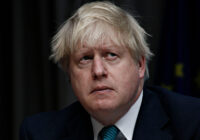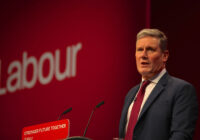Before being swept from power and leaving Britain unmoored, Theresa May has had one last sweep with her parliamentary broom.
In a January 30 headline, The Daily Mail can’t contain its excitement at what it sees as a historic moment: “Sweeping victory for May as she wins all but one vote in Commons showdown, crushing Remainer rebel bid to delay Brexit and winning mandate to return to Brussels and renegotiate backstop.”
British Prime Minister Theresa May has indeed won a mandate… to go forth and lose a negotiation that the European Union has adamantly insisted will never take place.
Here is today’s 3D definition:
Sweeping:
When describing a victory in the political arena, decisive and unambiguous even when applied to situations devoid of meaning in which the victory is guaranteed to produce no result
Contextual note
The utter, perhaps voluntary blindness and naive presumptuousness of a portion of the British elite — its politicians but especially its media — has never been more on display than in this episode. Not only have EU leaders made it clear that the one item Prime Minister May has staked her own reputation and survival on by promising to renegotiate is no longer open to negotiations, but anyone who understands what the European Union is and how it works knows that this unambiguous stance cannot be just a bluff in a friendly poker game.
But the British will always be convinced that they and their problems are so important, so others will make the sacrifice to save them from suicide.
It’s difficult to believe that Britain’s leaders, in both of the major parties, could be that dense. They appear to have no choice. The explanation comes not from the politicians themselves, but, as happens so often today, from the media. The entire Brexit fiasco has, from the beginning, developed into a media game. The media thrive on issues that contain stark contrasts and provoke strong emotions.
David Cameron, the incorrigibly elitist and ever so rational former prime minister, casually provided the population with a glaringly simplistic referendum in 2016. This was a pretext for Brits to express their extreme emotions once and for all, making it possible — when it was all over — to acknowledge the irrelevance of the exercise before getting back to business. The media jumped on a rare opportunity. They saw it as the perfect pretext for fomenting a pitched battle of wills, personalities and emotions.
The media spectacle provoked the inevitable. The population voted with its emotions, not according to some reasoned political, philosophical, economic or even ideological thought. Both of the majors parties ended up split down the middle, meaning they could no longer frame future policy along the lines of their traditional political focus — on business for the Conservatives and on the needs of the working class for Labour.
So, should we feel more surprised by the fact that, less than two months before the Brexit deadline, no viable solution is in view, or by the fact that the politicians continue to propose last-minute solutions that are rejected even before being clearly formulated?
Historical note
John Donne, the great metaphysical poet and dean of St Paul’s Cathedral, in a sermon on the theme of the theme of death, provided the English language with one of its most memorable aphorisms: “no man is an island.” In the same sermon, he gave Ernest Hemingway the title of one of his novels when he wrote, “Ask not for whom the bell tolls.” Just as memorably, Donne wrote in the same sermon, “if a clod be washed away by the sea, Europe is the less, as well as if a promontory were.”
 Britain’s Tory politicians seem to have retained only one small idea from that sermon: If a hard Brexit is concluded, they want their colleagues on the continent to realize that Europe will be “the less,” hoping the EU will realize its folly and invite them back. Translated into modern discourse that would be: You could have kept us, but you foolishly let us go. In accordance with Donne’s analogy, Britain sees itself as an invaluable promontory and can’t conceive of the idea that Europe sees it as a clod.
Britain’s Tory politicians seem to have retained only one small idea from that sermon: If a hard Brexit is concluded, they want their colleagues on the continent to realize that Europe will be “the less,” hoping the EU will realize its folly and invite them back. Translated into modern discourse that would be: You could have kept us, but you foolishly let us go. In accordance with Donne’s analogy, Britain sees itself as an invaluable promontory and can’t conceive of the idea that Europe sees it as a clod.
Despite England’s recurrent wars with the continent in the 16th and 17th centuries, Donne clearly saw what Shakespeare called Britain’s “scepter’d isle” as part of Europe. The imaginary clod and promontory he mentioned could equally have been in France, Spain, Italy, Holland or England.
Just as Donne felt no man is an island, he would have agreed that, in political and cultural terms, no nation is an island.
We had to wait till the 21st century for some British politicians — aided and abetted by the eager media — to start believing that and turning it into a public issue, presumably to their own personal advantage. The ultimate irony is that it most likely will turn against all of them. In which case, they would be wise to turn again to Donne’s sermon for their ultimate reassurance: “[F]or affliction is a treasure, and scarce any man hath enough of it.”
*[In the age of Oscar Wilde and Mark Twain, another American wit, the journalist Ambrose Bierce, produced a series of satirical definitions of commonly used terms, throwing light on their hidden meanings in real discourse. Bierce eventually collected and published them as a book, The Devil’s Dictionary, in 1911. We have shamelessly appropriated his title in the interest of continuing his wholesome pedagogical effort to enlighten generations of readers of the news.]
The views expressed in this article are the author’s own and do not necessarily reflect Fair Observer’s editorial policy.
Support Fair Observer
We rely on your support for our independence, diversity and quality.
For more than 10 years, Fair Observer has been free, fair and independent. No billionaire owns us, no advertisers control us. We are a reader-supported nonprofit. Unlike many other publications, we keep our content free for readers regardless of where they live or whether they can afford to pay. We have no paywalls and no ads.
In the post-truth era of fake news, echo chambers and filter bubbles, we publish a plurality of perspectives from around the world. Anyone can publish with us, but everyone goes through a rigorous editorial process. So, you get fact-checked, well-reasoned content instead of noise.
We publish 2,500+ voices from 90+ countries. We also conduct education and training programs
on subjects ranging from digital media and journalism to writing and critical thinking. This
doesn’t come cheap. Servers, editors, trainers and web developers cost
money.
Please consider supporting us on a regular basis as a recurring donor or a
sustaining member.
Will you support FO’s journalism?
We rely on your support for our independence, diversity and quality.






